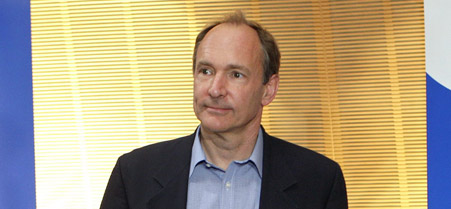The founder of the Web wants to protect you from the Web
Tim Berners-Lee reframes the argument for personal privacy.
 Martial Trezzin/AP file photo
Martial Trezzin/AP file photo
Tim Berners-Lee, the inventor of the World Wide Web, has moved into a new role: the defender of the World Wide Web. And, more specifically, the defender of the users of the World Wide Web. In an interview with The Guardian , the innovator-turned-advocate argued that users should demand their personal data from the companies that would try to contain them.
That's not surprising; Berners-Lee has been a staunch and vocal and passionate proponent of keeping the open web actually open -- and data ownership is a part of that. What's interesting, though, is the way Berners-Lee is framing his argument for openness. "My computer has a great understanding of my state of fitness, of the things I'm eating, of the places I'm at," Berners-Lee told reporter Ian Katz. "My phone understands from being in my pocket how much exercise I've been getting and how many stairs I've been walking up and so on." Katz summarizes the inventor's argument like so: "Exploiting that information could provide hugely useful services to individuals."
Hugely useful services . Yes. And while that line of logic creates as many questions as it answers -- what, actually, would those services look like? -- it's worth noting how Berners-Lee is presenting it. We tend to think about data and privacy and all the rest in, generally, negative terms: Your data need protection. Your data need to be feared for. Do a quick search of "personal data" on Google News; odds are, the headlines served up will contain words like "concerns," "trust," "privacy," "theft," etc. And our data demand vigilance, the logic goes, because they are, in a very real sense, an extension of who we are. Our info, ourselves. Our data trails, we assume, must be kept safe from others because they lead, in the end, to our identities.
Read the full story at The Atlantic .





